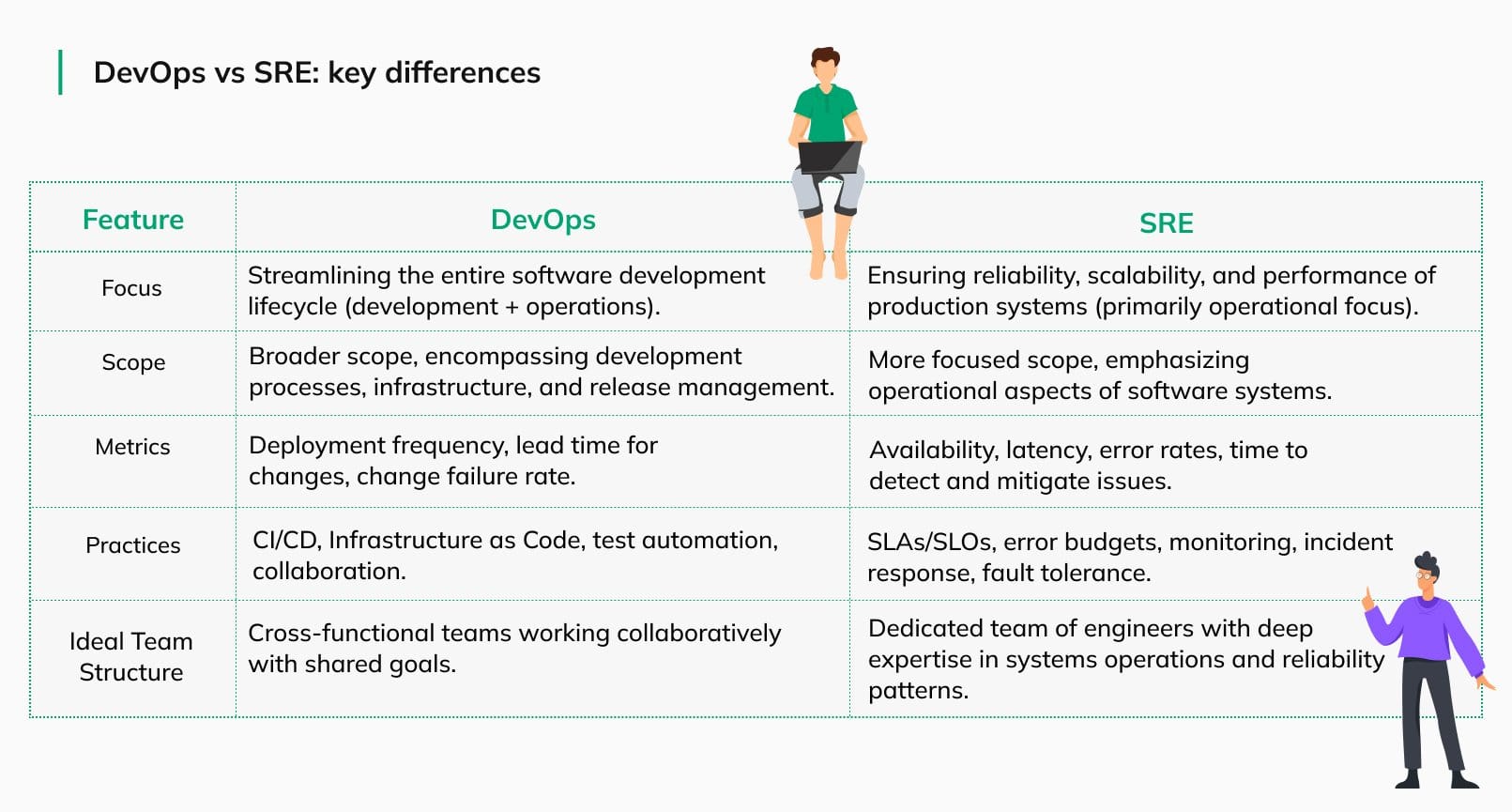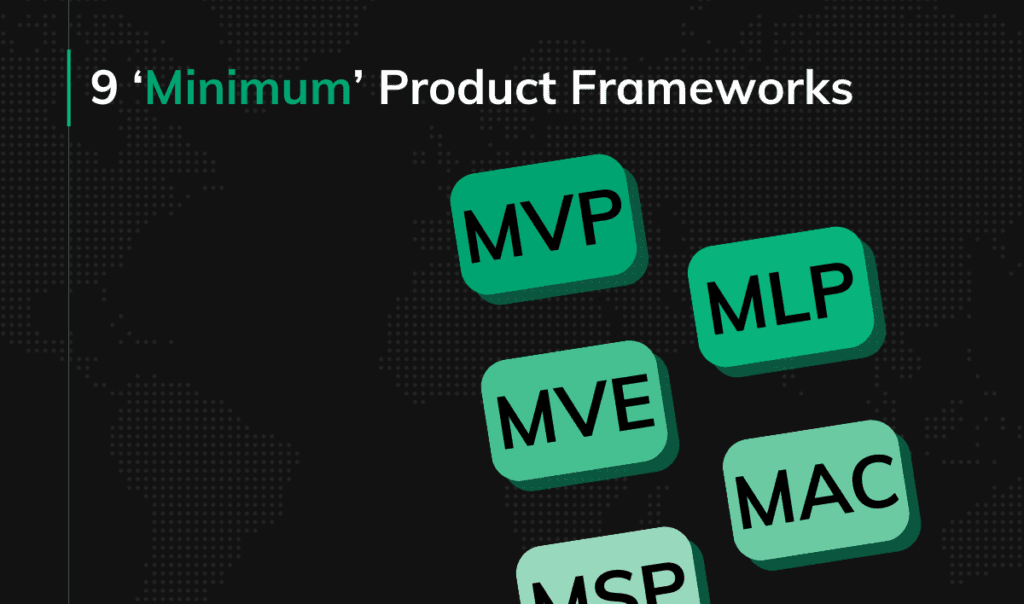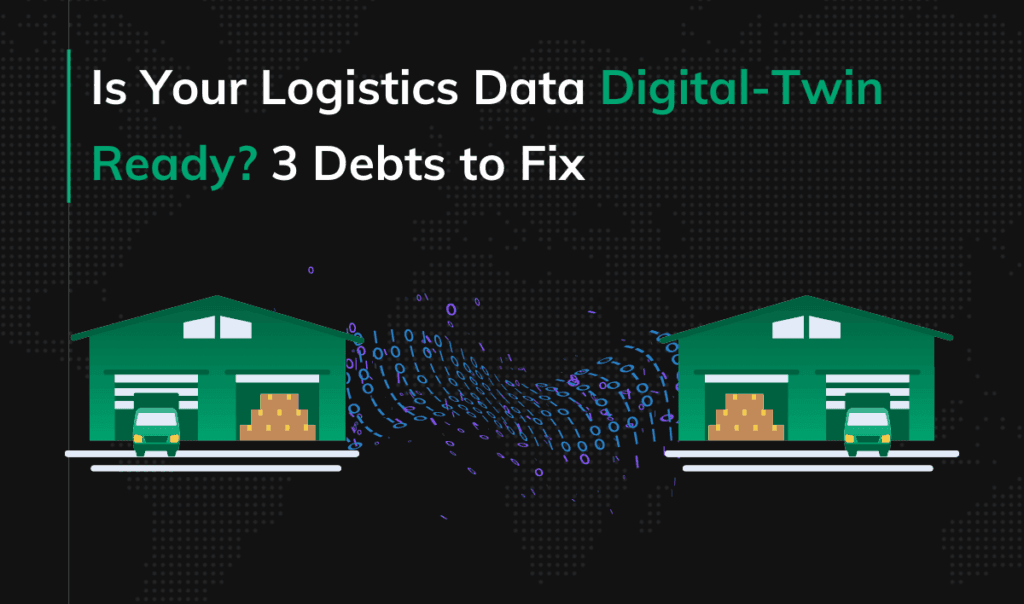DevOps vs SRE services: exploring the differences
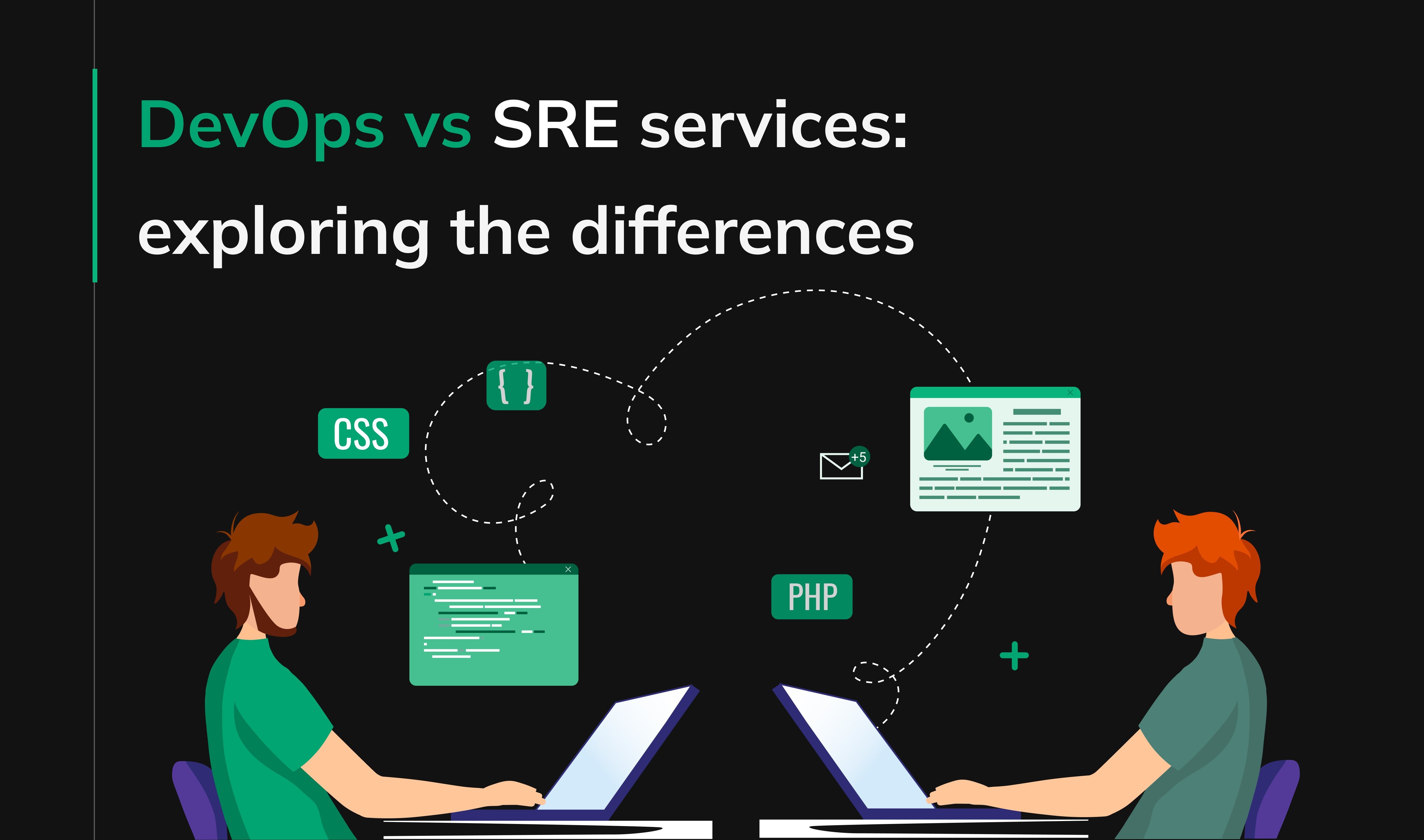
In the ever-evolving world of software development, ensuring the smooth operation and reliability of your cloud-based products is paramount. Two key approaches have emerged to tackle this challenge: DevOps and Site Reliability Engineering (SRE). While both share a common goal of optimizing software delivery and ensuring system stability, they differ in their focus and implementation.
This article delves deeper into the nuances of the SRE and DevOps roles. It provides you with the necessary insights to choose the most suitable approach for your specific needs.
What is DevOps?
DevOps, a cultural and methodological shift, emphasizes collaboration and automation throughout the entire software development lifecycle. It aims to break down silos that traditionally separated development and operations teams. This fosters a collaborative environment where both teams work towards a shared objective: delivering high-quality software more efficiently and reliably.
To understand the broader context of how DevOps fits into the software development landscape, you might be interested in this article exploring the differences between product development and software development.
Here are some key principles DevOps focuses on:
- Continuous integration and continuous delivery (CI/CD): This practice involves frequently merging code changes (integration) and automatically deploying them to production environments (delivery) in a controlled manner. This allows for faster feedback loops and quicker identification of potential issues.
- Infrastructure as Code (IaC): This approach treats infrastructure as software, allowing for its definition and management using code. This promotes consistency, repeatability, and automated provisioning of infrastructure resources.
- Shared responsibility and ownership: Both development and operations teams share responsibility for the entire software lifecycle, fostering a culture of collaboration and accountability.
By embracing these key DevOps principles, dev teams achieve the following benefits:
- Faster time to market: Reduced deployment lead times allow businesses to quickly respond to market changes and deliver features to users faster.
- Improved software quality: Continuous integration and automated testing practices lead to early detection and resolution of bugs, resulting in higher quality software releases.
- Increased efficiency: Automation of repetitive tasks frees up resources for developers and operations teams to focus on higher-value activities.
What is Site Reliability Engineering (SRE)?
Site Reliability Engineering is a discipline focused on designing, building, and maintaining highly reliable, scalable, and resilient systems. Unlike DevOps, which encompasses the entire software development lifecycle, SREs specifically focus on the operational aspects of ensuring system stability and performance.
Here are some key principles of SRE:
- Service Level Agreements (SLAs): SRE teams define and track measurable metrics like uptime, latency, and availability through SLAs. These metrics help them quantify the performance of their systems and ensure they meet user expectations.
- Automation and tooling: Similar to DevOps, SRE teams rely heavily on automation to monitor systems, identify potential issues, and perform corrective actions. They also leverage various tools for monitoring, logging, and incident response.
- Data-driven decision making: SRE teams base their decisions on data and analysis of system metrics. This enables them to proactively identify and address potential problems before they impact users.
By following these principles, SRE teams achieve the following benefits:
- Improved system reliability: Proactive monitoring and automated incident response lead to fewer outages and disruptions to users.
- Increased system scalability: Design principles and automation enable systems to scale effectively to meet changing demands.
- Reduced operational costs: Automation and proactive maintenance help to minimize downtime and resource consumption, leading to overall cost reduction.
DevOps vs SRE: key differences
What’s the difference between SRE and DevOps? While both of them aim to optimize delivery and functionality, their approaches exhibit subtle yet important distinctions. Here’s a breakdown of the primary differences between these two methodologies:
| Feature | DevOps | SRE |
|---|---|---|
| Focus | Streamlining the entire software development lifecycle (development + operations). | Ensuring reliability, scalability, and performance of production systems (primarily operational focus). |
| Scope | Broader scope, encompassing development processes, infrastructure, and release management. | More focused scope, emphasizing operational aspects of software systems. |
| Metrics | Deployment frequency, lead time for changes, change failure rate. | Availability, latency, error rates, time to detect and mitigate issues. |
| Practices | CI/CD, Infrastructure as Code, test automation, collaboration. | SLAs/SLOs, error budgets, monitoring, incident response, fault tolerance. |
| Ideal Team Structure | Cross-functional teams working collaboratively with shared goals. | Dedicated team of engineers with deep expertise in systems operations and reliability patterns. |
Understanding the nuances of SRE and DevOps
Think of DevOps as setting the foundation for smooth sailing. It ensures that the ship itself is built efficiently and all teams are rowing in sync. SRE takes over once the ship is launched. It steers through turbulent waters, constantly monitoring performance and course-correcting as needed. This keeps it on track and helps reach its destination.
SRE or DevOps: choosing the right path
While both DevOps and SRE offer valuable approaches to managing cloud-based products, the optimal choice depends on your specific needs and circumstances. Here are some key factors to consider when choosing which one to implement:
1. Infrastructure complexity
- If your product requires significant custom infrastructure development beyond standard cloud configurations, a dedicated DevOps team might be better equipped to handle this complexity and provide ongoing maintenance.
- If your infrastructure utilizes standardized configurations similar to those used by other clients, SRE services can often manage them efficiently, potentially offering a cost-effective solution.
2. Resource requirements
- Do you need flexible resources for ongoing infrastructure changes and maintenance? A DevOps team can provide this flexibility, allowing you to scale your resources up or down as needed.
- If you prioritize cost-efficiency and predictable resource utilization, SRE services can offer a fixed monthly fee. This eliminates the need to manage salaries and benefits associated with a full-time team.
3. Support requirements
- Do you require 24/7 support and monitoring for your infrastructure? A dedicated SRE team can ensure round-the-clock monitoring and rapid response to any issues that arise.
- If your business operates during specific hours and downtime tolerances are less stringent, you may not require continuous support, potentially making DevOps a viable.
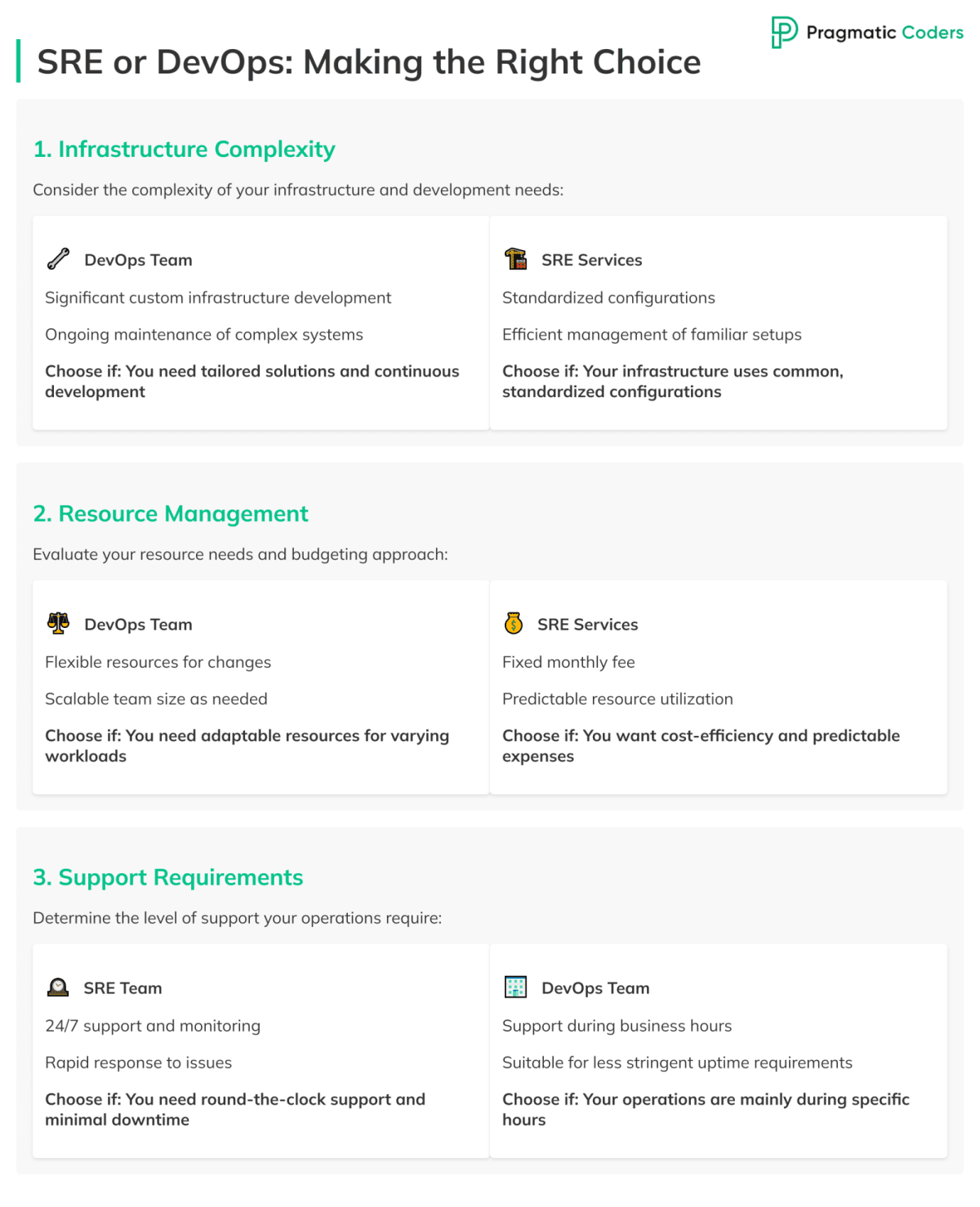
Optimizing your cloud journey with DevOps and SRE services from Pragmatic Coders
At Pragmatic Coders, we understand the challenges businesses face in navigating the complexities of DevOps and SRE approaches. We offer a range of agile services designed to help you optimize your cloud journey. This ensures the seamless operation of your products.
1. SRE services
We offer comprehensive SRE services to help you achieve the following:
Cost-effective 24/7 Support: Our dedicated SRE team provides round-the-clock monitoring and support for your infrastructure. This ensures optimal performance and rapid response to any issues.
Standardized Infrastructure with IaC: We leverage Infrastructure as Code (IaC). This ensures consistent, automated, and easily updateable infrastructure configurations across all our clients. It minimizes the risk of errors and simplifies maintenance.
Predictable Monthly Fee: We offer transparent pricing with a flat monthly fee. This eliminates the uncertainty associated with managing salaries, benefits, and recruitment costs for a full-time DevOps team.
On-demand Services: We provide additional services. These include provisioning new cloud resources, setting up development and testing environments, and offering expert consulting on specific infrastructure needs.
2. Custom DevOps solutions
For companies with complex infrastructure requirements, we offer custom DevOps solutions tailored to their specific needs. This might involve:
Dedicated DevOps Team: We can assemble a team of experienced DevOps engineers specifically dedicated to your project. This team will work seamlessly with your development team to ensure efficient delivery, continuous integration, and ongoing infrastructure management.
Hybrid Approach: We can combine elements of DevOps and SRE to create a customized solution that addresses your unique challenges. This may involve incorporating SRE best practices for monitoring and automation. Meanwhile, we maintain a dedicated DevOps team for specific development and infrastructure needs.
3. Expert guidance
Our team of seasoned professionals can help you navigate the decision between DevOps and SRE. We will:
Analyze your specific requirements: Understanding your unique needs is our priority.
Consider budget constraints: We’ll find a solution that fits your financial situation.
Assess infrastructure complexity: Our experts will evaluate the intricacies of your infrastructure to recommend the most suitable approach for your long-term success.
Ready to discuss your specific needs and explore how we can help?
Contact us today!
Conclusion
Choosing between DevOps and SRE is not a one-size-fits-all solution. By carefully evaluating your specific needs and priorities, you can determine the approach that best aligns with your goals. Partnering with an experienced service provider like Pragmatic Coders can provide valuable guidance and expertise. This ensures smooth operation, efficient delivery, and ultimate success for your cloud-based products.

